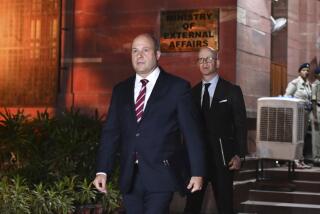Angry N. Korea Withdraws From Arms Talks
- Share via
WASHINGTON — Miffed by Washington’s welcome to two high-ranking defectors, North Korea abruptly pulled out of missile proliferation talks scheduled for Wednesday, stalling U.S. efforts to persuade the Communist regime to curb its arms sales to rogue states such as Iran.
Li Gun, North Korea’s deputy U.N. representative, said in a statement: “The U.S. offer of shelter to the criminals seriously damaged the climate, preventing our government from resuming the talks.”
The North’s Korean Central News Agency said the defectors, North Korea’s ambassador to Egypt and his diplomat brother, were about to be accused of embezzlement. It suggested that they sought refuge in the United States to avoid prosecution.
White House spokesman Barry Toiv said North Korea’s decision to recall its delegation from the New York talks was “not unexpected” after the high-profile defections.
U.S. officials anticipate that the breakdown will be temporary. Although they acknowledge there is no way to read the intentions of Kim Jong Il’s secretive regime, they say North Korea has little to gain from breaking off the talks permanently.
Faced with a severe food crisis, North Korea has opened a few cracks in its hermetically sealed society in an effort to obtain food aid from the United States and the West. U.S. officials say North Korea has become a more reasonable negotiating partner in recent years, although it remains frequently opaque and frustrating to deal with.
State Department spokesman James P. Rubin said the Clinton administration will take its time trying to reschedule the talks, awaiting the “appropriate” moment. He said U.S. diplomats have “been through a lot of ups and downs in the area of negotiating with the North Koreans” and understand the advantages of biding their time.
“We’ve seen cases where incidents of this kind . . . did temporarily interfere with the diplomatic processes of negotiating agreements in the interest of the United States,” he said. “So our diplomats are determined; they’re in it for the long haul.”
Chang Sung Gil, the North Korean ambassador to Egypt and a former vice foreign minister, and his brother, Chang Sung Ho, a commercial counselor at the North Korean mission in Paris, are seeking political asylum in the United States. U.S. officials expect them to provide important intelligence, especially about North Korean missile sales in the Middle East.
The scheduled New York talks were the third round of negotiations aimed at curbing North Korea’s sales of missiles and other arms. The United States is urging the government in Pyongyang to sign an international treaty regulating missile exports.
Rubin said the negotiations are “a natural follow-on to the successful negotiation of the nuclear framework agreement that stopped their nuclear program, and we would like these talks to be rescheduled.”
He was referring to North Korea’s agreement to freeze what the United States considered a nuclear weapons program in exchange for two modern light-water nuclear reactors. Ground was broken earlier this month for the reactors, which are being built by a South Korean firm with financing from South Korea, Japan and the United States.
According to figures compiled by South Korea, Pyongyang exports about $500 million worth of Scud missiles a year. The South Korean analysis estimates that arms exports accounted for about 30% of North Korea’s total exports between 1980 and 1993.
U.S. officials concede they have no idea whether North Korea will attend talks scheduled for next month to plan a proposed conference to write a peace treaty that would replace the shaky truce that ended the Korean War in 1953. But these officials expect North Korea to return to the bargaining table eventually.
Also Wednesday, North Korea announced that it was withdrawing from the United Nations human rights organization to protest a resolution charging Pyongyang with rights violations that the government said “totally distorts the reality of our country.”
The move stemmed from a vote by a U.N. rights panel of 26 independent experts that expressed concern over “persistent and concordant allegations that grave violations of human rights are being committed” in North Korea.
More to Read
Sign up for Essential California
The most important California stories and recommendations in your inbox every morning.
You may occasionally receive promotional content from the Los Angeles Times.













